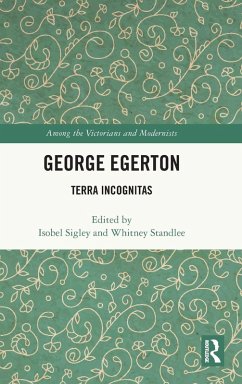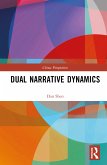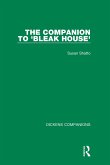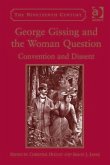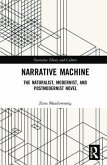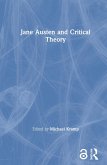George Egerton
Terra Incognitas
Herausgeber: Sigley, Isobel; Standlee, Whitney
George Egerton
Terra Incognitas
Herausgeber: Sigley, Isobel; Standlee, Whitney
- Gebundenes Buch
- Merkliste
- Auf die Merkliste
- Bewerten Bewerten
- Teilen
- Produkt teilen
- Produkterinnerung
- Produkterinnerung
George Egerton: Terra Incognitas is the first published work to focus solely on Egerton and her literary legacy. It covers the range and extent of Egerton's life and literary career from her emergence in 1893 to her dramatic works and their performance history into the 1920s.
Andere Kunden interessierten sich auch für
![Dual Narrative Dynamics Dual Narrative Dynamics]() Dan ShenDual Narrative Dynamics167,99 €
Dan ShenDual Narrative Dynamics167,99 €![J. G. Farrell J. G. Farrell]() Ronald BinnsJ. G. Farrell68,99 €
Ronald BinnsJ. G. Farrell68,99 €![The Autobiography, Times, Opinions and Contemporaries of Sir Egerton Brydges The Autobiography, Times, Opinions and Contemporaries of Sir Egerton Brydges]() Samuel Egerton BrydgesThe Autobiography, Times, Opinions and Contemporaries of Sir Egerton Brydges40,99 €
Samuel Egerton BrydgesThe Autobiography, Times, Opinions and Contemporaries of Sir Egerton Brydges40,99 €![The Companion to 'Bleak House' The Companion to 'Bleak House']() Susan ShattoThe Companion to 'Bleak House'165,99 €
Susan ShattoThe Companion to 'Bleak House'165,99 €![George Gissing and the Woman Question George Gissing and the Woman Question]() Christine HuguetGeorge Gissing and the Woman Question207,99 €
Christine HuguetGeorge Gissing and the Woman Question207,99 €![Narrative Machine Narrative Machine]() Zena MeadowsongNarrative Machine187,99 €
Zena MeadowsongNarrative Machine187,99 €![Jane Austen and Critical Theory Jane Austen and Critical Theory]() Jane Austen and Critical Theory180,99 €
Jane Austen and Critical Theory180,99 €-
-
-
George Egerton: Terra Incognitas is the first published work to focus solely on Egerton and her literary legacy. It covers the range and extent of Egerton's life and literary career from her emergence in 1893 to her dramatic works and their performance history into the 1920s.
Hinweis: Dieser Artikel kann nur an eine deutsche Lieferadresse ausgeliefert werden.
Hinweis: Dieser Artikel kann nur an eine deutsche Lieferadresse ausgeliefert werden.
Produktdetails
- Produktdetails
- Verlag: Taylor & Francis
- Seitenzahl: 290
- Erscheinungstermin: 26. November 2024
- Englisch
- Abmessung: 229mm x 152mm x 19mm
- Gewicht: 581g
- ISBN-13: 9781032532363
- ISBN-10: 103253236X
- Artikelnr.: 70942445
- Herstellerkennzeichnung
- Libri GmbH
- Europaallee 1
- 36244 Bad Hersfeld
- gpsr@libri.de
- Verlag: Taylor & Francis
- Seitenzahl: 290
- Erscheinungstermin: 26. November 2024
- Englisch
- Abmessung: 229mm x 152mm x 19mm
- Gewicht: 581g
- ISBN-13: 9781032532363
- ISBN-10: 103253236X
- Artikelnr.: 70942445
- Herstellerkennzeichnung
- Libri GmbH
- Europaallee 1
- 36244 Bad Hersfeld
- gpsr@libri.de
Isobel Sigley was awarded a PhD in English from Loughborough University in 2023. Her thesis 'A (New) Woman's Touch: Tactility and Feminism in Women's Fin-de-Siecle Short Fiction, 1880-1930' examines tactility as a form of feminist praxis within women's short stories of the late-nineteenth and early-twentieth centuries. She has published work on George Egerton (2021, VPJF) and Alice Dunbar-Nelson (2024, Journal of Medical Humanities), both of whose works were explored alongside works by Sarah Grand, Kate Chopin, Vernon Lee and Katherine Mansfield within Isobel's doctoral thesis. Prior to her PhD, Isobel gained an MA in English Literature from Keele University. Isobel first became fascinated by George Egerton when studying for her undergraduate degree at Loughborough University, where the first international conference dedicated to Egerton's life and works was held in 2017. Whitney Standlee is a Senior Lecturer in English Literature at the University of Worcester, and is the author of the monograph Power to Observe: Irish Women Novelists in Britain 1890-1916 (2015) and co-editor (with Anna Pilz) of Irish Women's Writing 1878-1922: Advancing the Cause of Liberty (2016/paperback 2018), both of which include original research on Egerton. A founding member of the Irish Women's Writing 1880-1920 Network, she and Pilz are also co-originators and editors of two popular series of online interviews for the network. Her most recent publications include a double issue of English Studies co-edited with Laing, Mooney, Ní Bheacháin, Pilz and Stevens entitled Connecting Voices: An Introduction to Irish Women Writers' Collaborations and Networks, 1880-1940 (2023).
Foreword: - Gerd Karin Bjørhovde, 'Encountering George Egerton in the
Scandinavian Context'
Introduction: - Isobel Sigley and Whitney Standlee
Part 1: Cosmopolitanism and Globalism
1. Peter Sjølyst-Jackson, '"A Foreign Element": George Egerton,
Scandinavian Literature and Knut Hamsun's Hunger'
2. Sravya Bhupatiraju, 'The Flagrancy of the Flâneuse: George Egerton's
Rejection of the Ideology of Gendered Spheres'
3. Paul March-Russell, 'Between Nietzsche and Wagner: Egerton's "Wounded
Modernism"'
Part 2: Sexual Identities and Queer Form
4. Heather Marcovitch, 'George Egerton, John Lane, and Radical Friendship'
5. Niels Caul, 'The Wheel of God: An Irish Modernist Bildungsroman'
6. Clare Stainthorp, '"Love is religion": Spiritual, Esoteric and
Epistolary Connection in Rosa Amorosa'
7. Rachel O' Nunain, 'Between Feminism and Conformity: Staging Female
Identity in The Backsliders (1911)'
Part 3: Feminist Geopolitics
8. Nathalie Saudo-Welby, '"How we women digress": Modernism, Feminism and
Deviation in George Egerton's short fiction of the 1890s'
9. Whitney Standlee, 'Medical and Legal Discourse and Varieties of
"Unnatural" Parenthood in the Works of George Egerton'
10. Isobel Sigley, 'The Key Note: Reassessing Egerton's Short Fiction
through Ellen Key's Concept of "Collective Motherliness"'
11. Éadaoin Regan, '"I suppose you are Irish" "Half of me": An exploration
of Irish identity and its role in mental illness in selected works of
George Egerton'
Part 4: Influence and Legacy
12. Eleanor Fitzsimons, 'George Egerton and the Liberation of Irish Women'
Afterword: Margaret D. Stetz, 'The Future of Egerton Studies'
Scandinavian Context'
Introduction: - Isobel Sigley and Whitney Standlee
Part 1: Cosmopolitanism and Globalism
1. Peter Sjølyst-Jackson, '"A Foreign Element": George Egerton,
Scandinavian Literature and Knut Hamsun's Hunger'
2. Sravya Bhupatiraju, 'The Flagrancy of the Flâneuse: George Egerton's
Rejection of the Ideology of Gendered Spheres'
3. Paul March-Russell, 'Between Nietzsche and Wagner: Egerton's "Wounded
Modernism"'
Part 2: Sexual Identities and Queer Form
4. Heather Marcovitch, 'George Egerton, John Lane, and Radical Friendship'
5. Niels Caul, 'The Wheel of God: An Irish Modernist Bildungsroman'
6. Clare Stainthorp, '"Love is religion": Spiritual, Esoteric and
Epistolary Connection in Rosa Amorosa'
7. Rachel O' Nunain, 'Between Feminism and Conformity: Staging Female
Identity in The Backsliders (1911)'
Part 3: Feminist Geopolitics
8. Nathalie Saudo-Welby, '"How we women digress": Modernism, Feminism and
Deviation in George Egerton's short fiction of the 1890s'
9. Whitney Standlee, 'Medical and Legal Discourse and Varieties of
"Unnatural" Parenthood in the Works of George Egerton'
10. Isobel Sigley, 'The Key Note: Reassessing Egerton's Short Fiction
through Ellen Key's Concept of "Collective Motherliness"'
11. Éadaoin Regan, '"I suppose you are Irish" "Half of me": An exploration
of Irish identity and its role in mental illness in selected works of
George Egerton'
Part 4: Influence and Legacy
12. Eleanor Fitzsimons, 'George Egerton and the Liberation of Irish Women'
Afterword: Margaret D. Stetz, 'The Future of Egerton Studies'
Foreword: - Gerd Karin Bjørhovde, 'Encountering George Egerton in the
Scandinavian Context'
Introduction: - Isobel Sigley and Whitney Standlee
Part 1: Cosmopolitanism and Globalism
1. Peter Sjølyst-Jackson, '"A Foreign Element": George Egerton,
Scandinavian Literature and Knut Hamsun's Hunger'
2. Sravya Bhupatiraju, 'The Flagrancy of the Flâneuse: George Egerton's
Rejection of the Ideology of Gendered Spheres'
3. Paul March-Russell, 'Between Nietzsche and Wagner: Egerton's "Wounded
Modernism"'
Part 2: Sexual Identities and Queer Form
4. Heather Marcovitch, 'George Egerton, John Lane, and Radical Friendship'
5. Niels Caul, 'The Wheel of God: An Irish Modernist Bildungsroman'
6. Clare Stainthorp, '"Love is religion": Spiritual, Esoteric and
Epistolary Connection in Rosa Amorosa'
7. Rachel O' Nunain, 'Between Feminism and Conformity: Staging Female
Identity in The Backsliders (1911)'
Part 3: Feminist Geopolitics
8. Nathalie Saudo-Welby, '"How we women digress": Modernism, Feminism and
Deviation in George Egerton's short fiction of the 1890s'
9. Whitney Standlee, 'Medical and Legal Discourse and Varieties of
"Unnatural" Parenthood in the Works of George Egerton'
10. Isobel Sigley, 'The Key Note: Reassessing Egerton's Short Fiction
through Ellen Key's Concept of "Collective Motherliness"'
11. Éadaoin Regan, '"I suppose you are Irish" "Half of me": An exploration
of Irish identity and its role in mental illness in selected works of
George Egerton'
Part 4: Influence and Legacy
12. Eleanor Fitzsimons, 'George Egerton and the Liberation of Irish Women'
Afterword: Margaret D. Stetz, 'The Future of Egerton Studies'
Scandinavian Context'
Introduction: - Isobel Sigley and Whitney Standlee
Part 1: Cosmopolitanism and Globalism
1. Peter Sjølyst-Jackson, '"A Foreign Element": George Egerton,
Scandinavian Literature and Knut Hamsun's Hunger'
2. Sravya Bhupatiraju, 'The Flagrancy of the Flâneuse: George Egerton's
Rejection of the Ideology of Gendered Spheres'
3. Paul March-Russell, 'Between Nietzsche and Wagner: Egerton's "Wounded
Modernism"'
Part 2: Sexual Identities and Queer Form
4. Heather Marcovitch, 'George Egerton, John Lane, and Radical Friendship'
5. Niels Caul, 'The Wheel of God: An Irish Modernist Bildungsroman'
6. Clare Stainthorp, '"Love is religion": Spiritual, Esoteric and
Epistolary Connection in Rosa Amorosa'
7. Rachel O' Nunain, 'Between Feminism and Conformity: Staging Female
Identity in The Backsliders (1911)'
Part 3: Feminist Geopolitics
8. Nathalie Saudo-Welby, '"How we women digress": Modernism, Feminism and
Deviation in George Egerton's short fiction of the 1890s'
9. Whitney Standlee, 'Medical and Legal Discourse and Varieties of
"Unnatural" Parenthood in the Works of George Egerton'
10. Isobel Sigley, 'The Key Note: Reassessing Egerton's Short Fiction
through Ellen Key's Concept of "Collective Motherliness"'
11. Éadaoin Regan, '"I suppose you are Irish" "Half of me": An exploration
of Irish identity and its role in mental illness in selected works of
George Egerton'
Part 4: Influence and Legacy
12. Eleanor Fitzsimons, 'George Egerton and the Liberation of Irish Women'
Afterword: Margaret D. Stetz, 'The Future of Egerton Studies'

